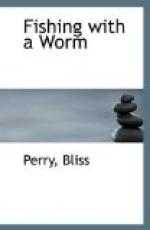Is all this but a disguised defense of pot-hunting? No. There is no possible defense of pot-hunting, whether it be upon a trout brook or in the stock market. Against fish or men, one should play the game fairly. Yet for that matter some of the most skillful fly-fishermen I have known were pot-hunters at heart, and some of the most prosaic-looking merchants were idealists compared to whom Shelley was but a dreaming boy. All depends upon the spirit with which one makes his venture. I recall a boy of five who gravely watched his father tramp off after rabbits,—gun on shoulder and beagle in leash. Thereupon he shouldered a wooden sword, and dragging his reluctant black kitten by a string, sallied forth upon the dusty Vermont road “to get a lion for breakfast.” That is the true sporting temper! Let there be but a fine idealism in the quest, and the particular object is unessential. “A true fisherman’s happiness,” says Mr. Cleveland, “is not dependent upon his luck.” It depends upon his heart.
No doubt all amateur fishing is but “play,”—as the psychologists soberly term it: not a necessary, but a freely assumed activity, born of surplusage of vitality. Nobody, not even a carpenter wearied of his job, has to go fishing unless he wants to. He may indeed find himself breakfast-less in camp, and obliged to betake himself to the brook,—but then he need not have gone into the woods at all. Yet if he does decide to fish, let him
“Venture as warily, use the same
skill,
Do his best, ...”
whatever variety of tackle he may choose. He can be a whole-souled sportsman with the poorest equipment, or a mean “trout-hog” with the most elaborate.




